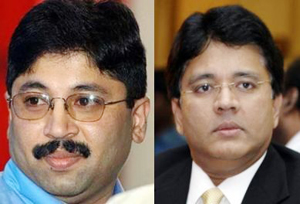New Delhi, Aug 29: Former Telecom Minister Dayanidhi Maran, his brother Kalanidhi Maran and six others, including four companies, were today chargesheeted by the CBI in a special court in the Aircel-Maxis deal case arising out of the investigation in the 2G spectrum allocation scam.
Besides the Maran brothers, the CBI has named Malaysian business tycoon T Ananda Krishnan, Ralph Marshall, a top executive and four companies, including Sun Direct TV Pvt Ltd and Malaysia's Maxis Communication Berhad, as accused in the case.
They have been chargesheeted for the offences punishable under section 120B (criminal conspiracy) of the IPC and under relevant provisions of the Prevention of Corruption Act.
The charge sheet was filed before Special CBI Judge O P Saini who fixed it for consideration on September 11.
Former Telecom Secretary J S Sharma, who has died, has also been named in the charge sheet. However, his name has been put in a column of the accused against whom trial cannot proceed.
South Asia Entertainment Holding Ltd, Mauritius, and ASTRO All Asia Network plc have also been named as accused in the charge sheet.
It was filed a day after the Supreme Court turned down the plea of Dayanidhi Maran seeking to restrain CBI from filing the charge sheet, saying that investigation in the case is still going on.
CBI, in the Supreme Court, had alleged that Maran had "forced" Chennai-based telecom promoter C Sivasankaran to sell the stake in Aircel to Malaysian firm Maxis Group in 2006 owned by Ananda Krishnan.
In a status report filed in the apex court, which is monitoring 2G scam probe, CBI had earlier said that during 2004-07 when Maran was Telecom Minister, former Aircel chief C Sivasankaran was coerced to sell the stake in Aircel to Maxis Group.
According to CBI, the Malaysian firm was favoured by Maran and granted licence within six months after taking over Aircel in December 2006.
The agency had told the apex court that overseas probe was being delayed due to the influence of the firm's owner in Malaysia who is "powerful politically".
It had informed the apex court that overseas probe was important to track the money trail as the funds for the deal had come through Mauritius.
CBI in 2011 had filed its FIR in the case alleging that Maran had used his influence to help Krishnan acquire Aircel by allegedly coercing its owner Sivasankaran.
Maran, who has been examined by CBI, has denied all the allegations levelled against him and his family members.
The agency had also sought information from the Malaysian authorities through Letters Rogatory (LRs) but it did not get satisfactory response, after which the judicial requests were sent again. The reply to second LR is pending.






Comments
Add new comment